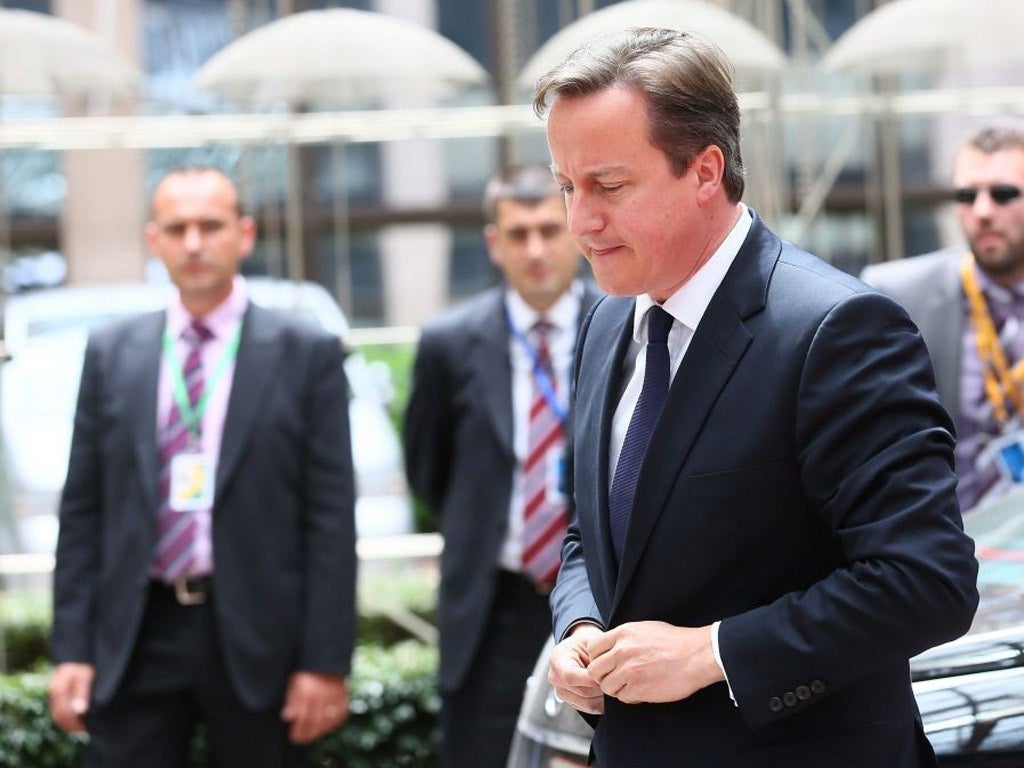David Cameron vows to win 'safeguards' for Britain at EU summit

Your support helps us to tell the story
From reproductive rights to climate change to Big Tech, The Independent is on the ground when the story is developing. Whether it's investigating the financials of Elon Musk's pro-Trump PAC or producing our latest documentary, 'The A Word', which shines a light on the American women fighting for reproductive rights, we know how important it is to parse out the facts from the messaging.
At such a critical moment in US history, we need reporters on the ground. Your donation allows us to keep sending journalists to speak to both sides of the story.
The Independent is trusted by Americans across the entire political spectrum. And unlike many other quality news outlets, we choose not to lock Americans out of our reporting and analysis with paywalls. We believe quality journalism should be available to everyone, paid for by those who can afford it.
Your support makes all the difference.David Cameron today warned fellow European leaders that he would not accept any reduction in Britain's EU rebate.
On the opening day of a European summit, the Prime Minister launched a pre-emptive strike to defend the reduction in the UK's contribution won by Margaret Thatcher in the 1980s.
The main focus of the gathering in Brussels is an ambitious long-term plan by senior EU officials to resolve the problems of the eurozone involving a significant pooling of powers by the 17 members of the single currency bloc.
However Mr Cameron used a preliminary discussion on the next EU budget for the period 2014-20 to make clear that the £3 billion annual rebate would not be only the table.
A UK official said: "That is not an issue we are willing to negotiate on.
"We think that as we go into this process it is important people have absolute clarity about our position."
The warning came as officials sought to damp down the prospects for progress at the summit, after German Chancellor Angela Merkel and French President Francois Hollande failed to bridge their differences over the way forward for the eurozone.
The long term plans on the table call for a banking union, a fiscal union and - ultimately - a political union for the eurozone to shore up EU integration.
However officials stressed the document was only circulated late on Monday and would need a lot of further work and discussion.
Mr Cameron acknowledged that it raised difficult issues for the countries involved but said that he hoped some progress could be made.
He said: "I know people are frustrated that these summits keep happening and not enough decisions are made.
"These are hard decisions for the eurozone countries to make and we should be encouraging them to go ahead."
While Britain would not be involved in any fiscal union, the Prime Minister also made clear that he would keep the UK out of the banking union, while safeguarding the single market.
He said: "Now of course we are saying to the eurozone countries they do need to do more things together to strengthen the currency and make sense of their currency but Britain is going to stay out of that.
"We want Europe to work for us, as a single market, as a place where we trade, as a place where we cooperate, and I'm going in there so that we get the safeguards to make sure that can keep happening."
In particular, Britain is determined to avoid the "mutualisation" of bank risks and the creation of centralised bank supervision across the whole EU.
Tory MEP Martin Callanan - leader of the European Conservatives and Reformists group in the European Parliament - said the summit risked becoming "another paper shuffling exercise".
"How many more summits must we have that fiddle around the edges and make worthy but vague commitments to jobs and growth?" he said.
"We seem no closer to reaching a conclusion to the euro crisis than when Greece first fell into trouble."
Mrs Merkel is insisting on maintaining rigid rules on job cuts, tax rises and repayment terms for those countries benefiting from multibillion-euro bailouts - largely funded by Berlin.
Mr Hollande has said the demands are so tough they are stifling all prospect of growth and recovery in the struggling eurozone states.
To appease France, Mrs Merkel agreed the need for a 130 billion euro (£104 billion) "compact for growth" which is expected to be adopted by all 27 leaders in a final summit declaration tomorrow.
But Germany is resisting the idea of pooling the eurozone debts in order to lower the risk.
The move would reassure jittery markets that the single currency has sustainable back-up.
But Mrs Merkel insists tough austerity policies are just as important and has warned: "I don't see total debt liability (for the eurozone) as long as I live."
PA
Join our commenting forum
Join thought-provoking conversations, follow other Independent readers and see their replies
Comments